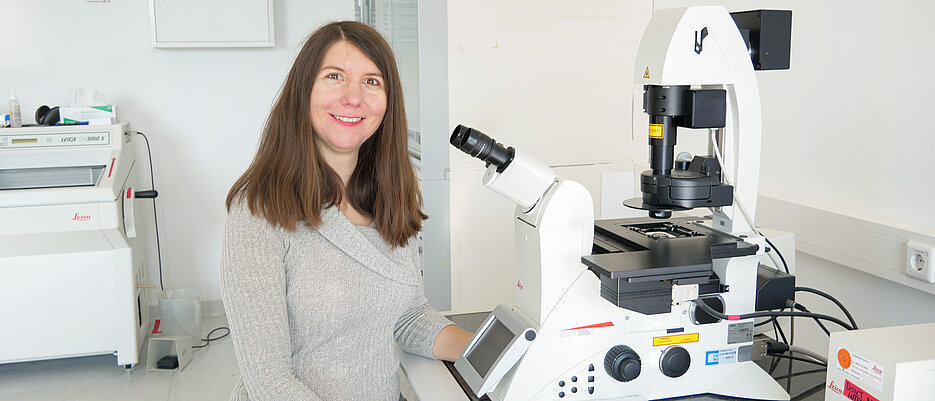New Impulses for Immune Research
09/05/2023Anna Lippert is the new junior professor for systems immunology at the University of Würzburg. With her research, she wants to create the basis for a more targeted treatment of cancer and immune diseases.

Viruses, bacteria and other pathogens have developed a number of sophisticated strategies to remain undetected by the human immune system. They deceive, camouflage and kill. Anna Lippert is researching how our immune cells nevertheless manage to identify and eliminate them. Since May, she has been a new junior professor for translational medicine at the Institute for Systems Immunology at the University of Würzburg (JMU).
"We already know a lot about how immune cells perceive their environment on a chemical level," explains the scientist, "for example, that they recognise infected cells or their characteristic molecular structure with the help of receptors." In addition to chemical properties, altered physical characteristics of diseased cells also play an important role, such as the characteristic stiffness of virus-infected cells. "And how our immune system perceives these characteristics has hardly been researched."
Basic research should serve to develop gentler therapies
Lippert's goal: to decipher what makes our immune system tick and to genetically modify immune cells in such a way that they specifically eliminate cells with certain characteristics. "If we could teach an immune cell, for example, to kill particularly soft cells, we would have a possible approach to fighting cancer," says the researcher. "Cancerous cells, after all, usually have a softer cytoskeleton than healthy cells."
In the future, basic research could contribute to replacing classic chemotherapies with gentler and more targeted treatments - or even prevent immune cells from attacking healthy cells, as is the case with autoimmune diseases. "We could also better understand neuropathies, diseases of the nervous system such as multiple sclerosis (MS), through our research."
International research
From the University of California in Berkeley and Cambridge University, where Lippert previously conducted research as part of a Henry Welcome Fellowship, she brings several research projects with her to Würzburg. "One focus of my work is understanding how immune cells perceive their mechanical environment," says Lippert. "The cells in our body change their stiffness during inflammation and diseases like cancer, and our immune cells are exposed to these changes and can detect them. If we understand how they do this, we can develop targeted immunotherapies that change the stiffness of tissues or make immune cells less or more sensitive to these stiffness changes." In addition, the junior professor is researching the molecular function of antibodies in neuropathies and the connection between cytoskeletons and the activation of immune cells from patients with immunodeficiencies.
Prior to her time at Berkeley and Cambridge, Lippert completed her PhD at the University of Cambridge on the topic of "How do antibodies activate immune cells?". She completed her Master's degree in “Integrated Life Sciences” at the Max Planck Institute for the Physics of Light in Erlangen, and her Bachelor's degree in "Integrated Life Sciences" also in Erlangen.
About the Institute for Systems Immunology
The Max Planck Research Group for Systems Immunology is an initiative of the University of Würzburg and the Max Planck Society (MPG). Its goal is excellent immunological research: around 50 international researchers investigate the development and function of the immune system. Their focus is on researching the immune response against infectious agents, chronic inflammatory diseases and tumors in order to develop new concepts and strategies for vaccines and immunotherapies.
Research Alliance Immunomedicine
The University of Würzburg is part of the research alliance immunomedicine (Forschungsallianz Immunmedizin). The aim of this alliance is the development of new diagnostic tools and therapies for major common diseases such as infections, cancer and autoimmune diseases. The alliance networks complementary strategies of the University sites Erlangen-Nürnberg, Regensburg and Würzburg and develops synergistic key areas to strengthen immunomedicine at the highest level in northern and eastern Bavaria.
Contact
Prof. Dr. Anna Lippert, Junior Professor of Systems Immunology, anna.lippert@uni-wuerzburg.de






